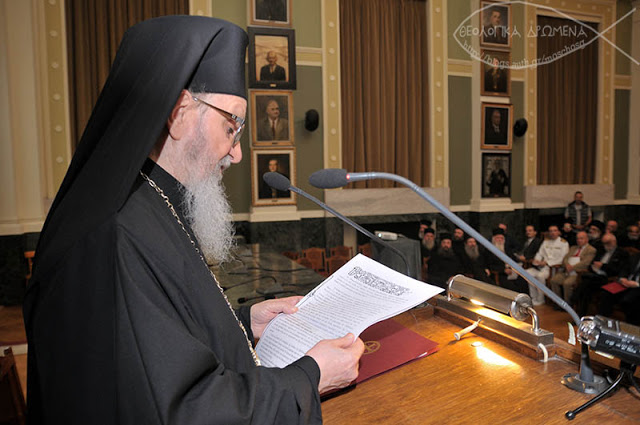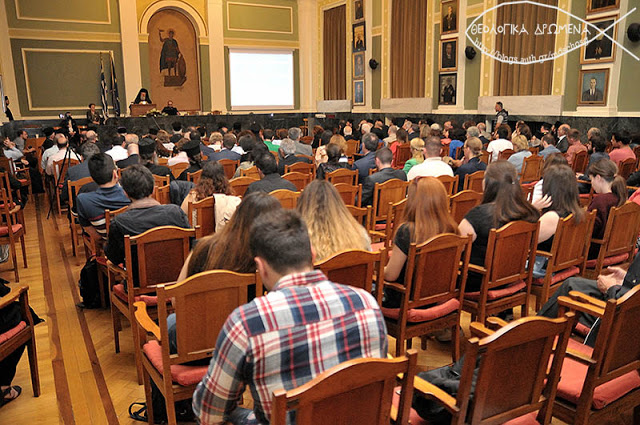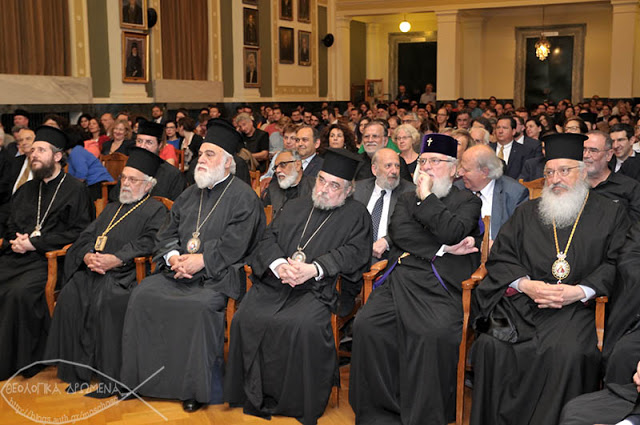

Professor Miltiadis Konstantinou, Dean of Aristotle University’s Faculty of Theology, our beloved son in the Lord: Grace be unto you and peace from God.
It is with profound joy that we greet the 8th International Conference of Orthodox Theology, which is convening in Thessaloniki from May 21st through May 25th on the theme “The Holy and Great Council of the Orthodox Church: Orthodox Theology in the 21st Century.”
The benevolent God of love, worshipped in Trinity and providing for all things, so deigned His Holy Church to realize the Holy and Great Council that took place at the Orthodox Academy of Crete in June of 2016, in accordance with the spirit of the Orthodox conciliar and canonical tradition.
The preparation for this Council marked the life of the Orthodox Church during the 20th century. The long journey leading up to the Holy and Great Council demonstrated the unity and stability of Orthodoxy. Despite tensions, varying approaches and estimations of the provocations and problems of the time, and despite the adventures of the Orthodox Churches participating in the Ecumenical Movement, as well as the turbulent circumstances encountered by the majority of Orthodox Autocephalous Churches, by divine inspiration, the Eastern Church of Christ proceeded to the convocation of the Holy and Great Council, which from the outset was associated with many expectations.
We gratefully remember the pioneers who prepared the Council and dutifully fought the good fight in the pre-conciliar period. We also wish to highlight the definitive contribution of the Orthodox Churches that participated in the Holy and Great Council, as well as to express our personal gratitude—as the Council’s President—for their seamless and creative cooperation and concord.
The Council’s aim was to proclaim Orthodox unity, address ongoing internal matters and offer a good witness to the contemporary world on the restoration of all things in Christ. The Holy and Great Council was not an introverted gathering but instead highlighted the openness of the Orthodox Church toward history, its love for humankind and the eternal relevance of the Gospel of love.
The unexpected announcement—immediately prior to the commencement of the conciliar proceedings—on the part of four Orthodox Autocephalous Churches not to participate was an unfortunate event, which nonetheless neither influenced the smooth course of the conciliar task nor infringed upon the broader conciliar conscience and identity of the Church. The decision to abstain was not taken on the grounds of ecclesiological, canonical or other theological criteria, but rather for the sake of facilitating motives foreign to the authentic tradition of the Church. For these reasons, the proposal to postpone the Council would quite manifestly have meant its definitive cancellation.
The Holy and Great Council constitutes an important chapter in the conciliar history of the One, Holy, Catholic and Apostolic Church, as well as a central event in the contemporary story of Orthodoxy. Indeed, through this Council, the Orthodox Church created history. The texts of the Holy and Great Council—referring to canonical structure, liturgical life and spirituality, relations of the Orthodox Church with the rest of the Christian world, and the Church’s mission in the contemporary world—stand out for their theological integrity, authentically expressing the Orthodox tradition and self-consciousness, as well as its sensitivity and concern for humanity’s existential problems, and for the contemporary social and cultural challenges. These conciliar texts are a precious spiritual treasure for Orthodox faithful and an invaluable legacy for generations to come.
In general, the Holy and Great Council’s work and decisions refute all those who imagine Orthodoxy as a closed and unworldly spirituality, indifferent toward history and culture—inasmuch as they are unaware of its immense contribution to society and civilization, as well as in the realm of philanthropy and solidarity. Indeed, the witness of the Council constitutes a very clear response to these self-ordained defenders of Orthodoxy, who slander the conciliar effort and divide the people of God.
We are obliged to work for the reception of the decisions of the Holy and Great Council by the plenitude of the Church and for their theological and pastoral appreciation, so that the conciliar texts may serve as a source of inspiration for the Orthodox faithful, who strive in their daily lives to reconcile their fidelity to tradition with their contemporary situation.
We are certain that this conference will contribute to this and to a proper theological assessment of the Council’s work and contribution.
The imminent publication of the Minutes of the Holy and Great Council will provide all interested persons with an opportunity to become familiar with and appreciate the common concern of the ten participating Orthodox Autocephalous Churches for the realization and fulfillment of the conciliar effort in accordance with God’s will, as well as for a deeper theological conversation and the absolute respect regarding the canonical tradition of the Church.
Therefore, we congratulate and thank all those who contributed to the preparation of this Conference, the members of the Organizing Committee, the Aristotle University and its Faculty of Theology, the generous benefactors, distinguished speakers and all the participants. We wish you every success for perceptive presentations, lively discussions and beneficial conclusions, and we bestow upon you our Patriarchal blessing, invoking upon all of you the gifts and illumination of the Heavenly Comforter, the All-Holy Spirit of wisdom and prudence.

